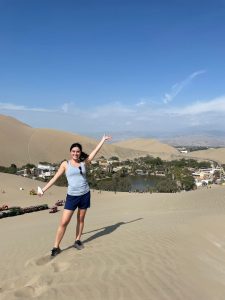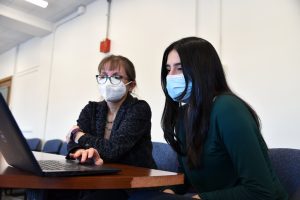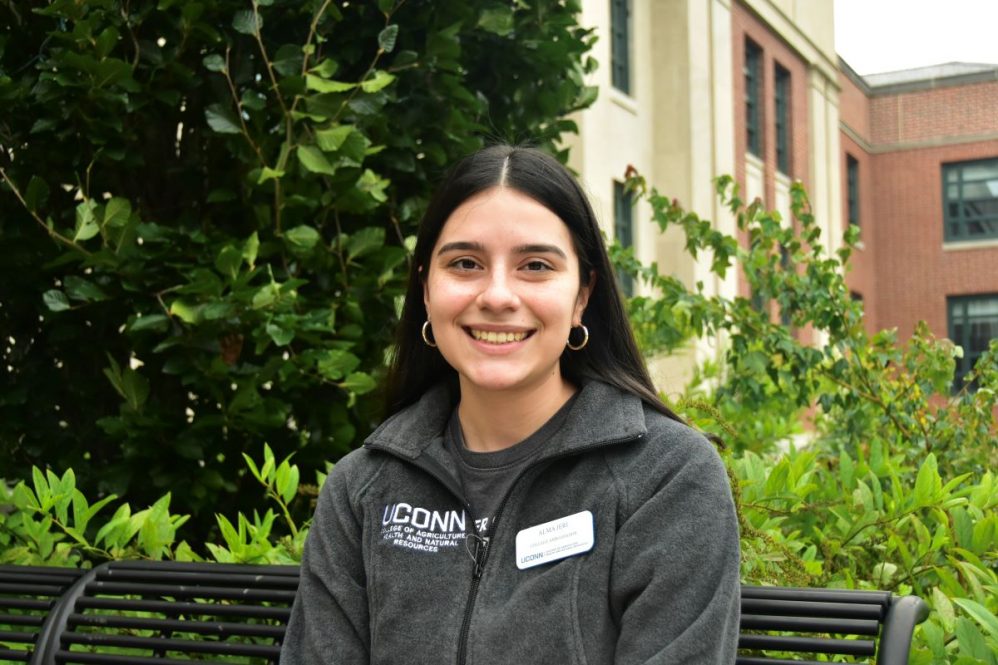 Alma Jeri-Wahrhaftig ’22 (CAHNR) watched medical dramas as a child with rapt attention, fascinated by the study of disease.
Alma Jeri-Wahrhaftig ’22 (CAHNR) watched medical dramas as a child with rapt attention, fascinated by the study of disease.
“I was always interested in health, my entire life,” Jeri-Wahrhaftig says. “I was very interested in disease and how it functions in the body.”
Originally from Massachusetts, Jeri-Wahrhaftig is majoring in allied health sciences with a minor in global studies. Through her experiences as an undergraduate researcher, Jeri-Wahrhaftig, has developed her skills and passion for culturally competent approaches to public health.

She decided to major in allied health sciences because of its interdisciplinary approach to the study of health. Jeri-Wahrhaftig credits the advising she received through the department for many of the positive experiences she has had at UConn.
“I have nothing but praise for the Department of Allied Health Sciences,” Jeri-Wahrhaftig says. “Every time I wanted to try something new, they just always were able to be flexible with me and it was really, really great.”
While initially intending to pursue a pre-med track at UConn, Jeri-Wahrhaftig is now pursuing public health, as she was more interested in preventing disease than treating it. She plans to pursue her master’s of public health starting in fall 2022. She hopes to work as an epidemiologist in the future, maintaining a focus on the all-important connections between health and culture.
“I felt a very strong need to want to prevent disease and prevent illness,” Jeri-Wahrhaftig says. “When I was learning about diseases, I was more focused on ‘why are we letting this happen’?”
Jeri-Wahrhaftig wanted to become involved in research as an undergraduate as she recognized how heavily the field of public health relies on scientific discovery. She also received valuable mentorship from older students in the Global House Learning Community who were involved in research.

Jeri-Wahrhaftig is conducting research with Associate Professor Molly Waring on leveraging social media technology for health promotion.
Currently, Jeri-Wahrhaftig is working on a study to determine what sources of online nutrition mothers trust most and what factors influence if they trust that source, such as if they contain personal testimony or expert approval.
“It’s really sparked an interest for me,” Jeri-Wahrhaftig says. “I’ve recognized the importance and role of research in the healthcare industry and the field of public health.”
Jeri-Wahrhaftig’s primary interest lies in international research, and the intersections of health and culture, an issue that hits close to home.
Jeri-Wahrhaftig, who is Peruvian American, comes from a culturally diverse background with family on every continent except Australia and Antarctica.
“It’s the intersection of two things I’m very passionate about: promoting health and preventing disease, and being aware and cognizant of cultural differences and how this may influence health-related behaviors,” Jeri-Wahrhaftig says.
Cultural differences can have wide-ranging implications for health and how one interacts with the healthcare system, from views on treatment options to general attitudes toward the medical establishment.
Jeri-Wahrhaftig joined Assistant Professor Roman Shrestha’s lab which is focused on addressing these multicultural problems. She is working on a study based in Nepal analyzing barriers to accessing HIV prevention and treatment in populations of men who have sex with men.
“His lab has been great in allowing me to further my interests and start focusing my own passions,” Jeri-Wahrhaftig says. “He’s also been a fantastic researcher and mentor as well. I’ve been very privileged to have had all these experiences with these great researchers.”
While the study is in its early stages, Jeri-Wahrhaftig has been working on developing a survey to distribute to participants and crafting IRB (Institutional Review Board) documents to get the necessary approvals for human subject work.
This work will fill a significant research gap as there is very little existing literature on HIV prevalence and associated factors that affect HIV care and access to treatment.
Understanding the barriers and needs of a given population and culture is an important step in making sure future interventions will find success.
“We’re better able to tailor interventions and know what method works best for the community,” Jeri-Wahrhaftig says.
For example, in many Latin American cultures, it is common to greet family and close friends by touching the cheek or giving a “besito.” But during a health emergency like the COVID-19 pandemic, medical professionals discourage this kind of physical contact as it may spread the disease. Providing guidance that acknowledges this cultural norm and finding culturally sensitive alternatives helps public health measures resonate with a community and makes them more effective.
Jeri-Wahrhaftig says a critical question for public health workers to consider is if a population to which they do not belong wants their help. Additionally, oftentimes, having the community run an intervention themselves will make it more successful and sustainable.
“It’s not always going to be you as the one who is going to fix all of the problems,” Jeri-Wahrhaftig says. “It’s not just about us, the people who are focusing on maintaining the health of a population. It’s about the population itself.”
Follow UConn CAHNR on social media



